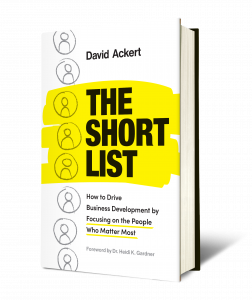Excellent client service is at the center of everything you do. Your education and experience give you the unique skills to meet your clients’ needs and address their challenges, and you wish every hour of the day were a billable hour because it would mean you were doing just that.
But unfortunately, if you don’t consistently take time out to focus on client and business development, the firm – and your career – will suffer. If your small or mid-size firm doesn’t have the luxury of having a marketing and business development team, you are truly on your own, responsible for this critical aspect of your job for which you have zero training.
If you look to technology to help with business development, Client Relationship Management would seem to be the obvious choice, and your firm likely already has it. According to our survey* of more than 600 small to mid-size professional services firms, 93% do.
But the research also shows several reasons why CRM doesn’t work as a business development solution.
1. Most seller-doers don’t use CRM.
According to our research, 89% of CRM users at small and mid-size firms are marketers or other employees. And, of seller-doers who do use CRM, only half use it regularly for business development.
We also learned that nearly six out of 10 firms spend between $10,000 and $150,000 on their CRM in a typical year, so it must be effective for something, which brings us to our next finding.
2. Very few small to mid-size firms find CRM very effective for pipeline management.
While the firms we surveyed find CRM moderately to highly effective for functions like contact management, file storage, lead capture, and list segmentation, more than half find it only moderately effective or ineffective for pipeline management.
3. CRM is not well-suited for seller-doers.
Small to mid-size firms cite several reasons that seller-doers don’t use CRM for their sales pipeline management.
More than half say CRM requires too much data entry, which goes hand in hand with the second top reason for low CRM adoption – they lack time to use it. Nearly 40% cite lack of mobile or remote access as seller-doers’ challenge in using CRM for business development, while a third cite lack of technological proficiency.
4. Old habits die hard.
It’s no secret most professional service firms are averse to change and slow to adopt new technologies compared to other industries.
According to our research, seller-doers at small to mid-size firms still rely on old-school tools like Word documents (64%), xl spreadsheets (57%), and paper notes (30%) rather than CRM to track business development.
5. CRM doesn’t address the top three business development challenges.
Our survey asked small to mid-size firms about their top business development challenges. 63% report that seller-doers lack the technology they need to be effective. Since we already know that nearly all firms have CRM, it clearly isn’t the right technology for business development.
The second top business development challenges cited are that seller-doers do not prioritize business development enough and don’t have the skills they need to be effective.
PipelinePlus sales acceleration software was explicitly designed for seller-doers. It is simple to use and accessible on desktop, laptop, or mobile. It helps seller-doers identify their most valuable prospects, clients, and referral sources and determine the next steps to close deals. In addition, it provides timely notifications and tips so seller-doers stay on track with their business development activities and features an e-library of micro-lessons on every aspect of the business development process.
Once only available to teams at larger firms, PipelinePlus is now also available for individual users. Get more details on the pricing page of our website.
*Survey data cited above is from the results of “The 2022 State of CRM in Professional Services” industry report research.







